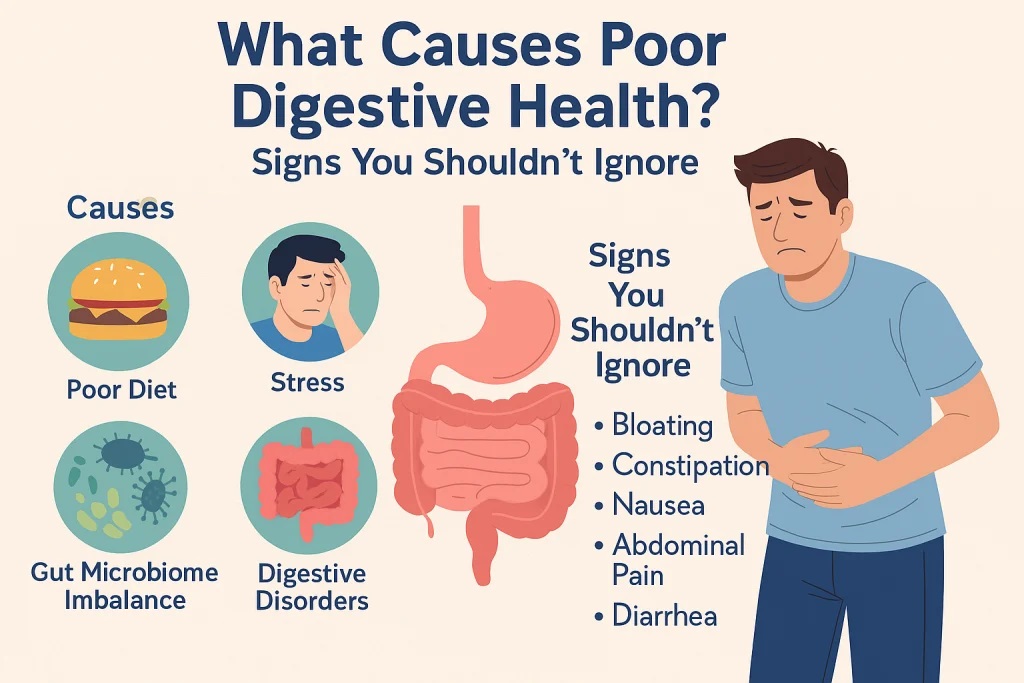In recent years, science has uncovered a fascinating link between the gut and the mental health, often referred to as the gut-brain axis. This connection has revolutionized how we understand mental health, suggesting that what we eat not only affects our body but also our mind. At Local MD, we believe that gut health plays a central role in emotional balance, mood regulation, and overall mental well-being.
Among the key players in this connection are probiotics — beneficial microorganisms that live in our intestines — and the nutrients that fuel them. In this in-depth article, we explore how probiotics and nutrition influence mental health, the science behind the gut-brain connection, and practical strategies to enhance emotional wellness through diet and lifestyle.
Understanding the Gut-Brain Connection
The gut and brain communicate constantly through a bi-directional network known as the gut-brain axis, involving the nervous system, immune system, and hormones. This system allows your intestinal bacteria to send signals that affect how you think, feel, and behave.
The vagus nerve, the body’s longest cranial nerve, acts as a direct communication pathway between the gut and the brain. Additionally, the gut produces key neurotransmitters like serotonin, dopamine, and gamma-aminobutyric acid (GABA) — chemicals that regulate mood, sleep, and stress responses.
A balanced gut microbiome helps maintain mental clarity, emotional stability, and resilience, while an imbalanced one — called dysbiosis — has been linked to anxiety, depression, and cognitive disorders.
The Gut Microbiome: Your Internal Ecosystem
Your gut microbiome consists of trillions of bacteria, fungi, and other microorganisms residing in the digestive tract. These microbes play essential roles in:
-
Breaking down and digesting food
-
Producing vitamins and short-chain fatty acids
-
Regulating the immune system
-
Protecting against harmful pathogens
-
Communicating with the brain via chemical messengers
When the microbiome is diverse and balanced, it promotes both physical and mental health. However, poor diet, stress, antibiotics, and lack of sleep can disrupt this delicate balance — negatively impacting mood and cognition.
How Probiotics Influence Mental Health
Probiotics are live microorganisms that, when consumed in adequate amounts, confer health benefits on the host. They primarily work by restoring balance to the gut microbiota and enhancing the production of neuroactive compounds that affect brain function.
1. Production of Mood-Regulating Neurotransmitters
Certain probiotic strains stimulate the production of neurotransmitters such as:
-
Serotonin: Often called the “happiness chemical”, about 90% of serotonin is produced in the gut. It regulates mood, sleep, and appetite.
-
GABA (Gamma-Aminobutyric Acid): Helps calm the nervous system and reduce anxiety.
-
Dopamine: Involved in pleasure, motivation, and reward mechanisms.
By supporting gut bacteria that produce these chemicals, probiotics can help regulate emotions and reduce symptoms of mood disorders.
Reduction of Inflammation
Chronic inflammation is a major contributor to depression and anxiety. Gut dysbiosis leads to increased intestinal permeability (often referred to as “leaky gut”), allowing toxins and inflammatory molecules to enter the bloodstream.
Probiotics help by:
-
Strengthening the intestinal barrier
-
Reducing the release of pro-inflammatory cytokines
-
Supporting immune system balance
This anti-inflammatory effect can alleviate mental health symptoms linked to systemic inflammation.
Stress Response Regulation
Stress alters gut microbiota composition, increasing the growth of harmful bacteria. In turn, an imbalanced microbiome intensifies stress sensitivity, creating a vicious cycle.
Probiotics — especially strains like Lactobacillus rhamnosus and Bifidobacterium longum — have been shown to modulate the hypothalamic-pituitary-adrenal (HPA) axis, reducing cortisol (the stress hormone) levels and improving stress resilience.
Enhanced Cognitive Function
Emerging studies show that probiotics can improve memory, focus, and learning ability by enhancing neurotransmitter activity and reducing brain inflammation. People with balanced gut flora often experience better cognitive performance and lower risk of neurodegenerative diseases.
Nutrition and Mental Health: Feeding the Gut to Heal the Mind
While probiotics are essential, they work best alongside a nutrient-rich, balanced diet that fuels beneficial gut bacteria and supports brain health. The gut microbiome thrives on prebiotics, vitamins, and healthy fats, which all contribute to mental wellness.
Prebiotics: Fuel for Good Bacteria
Prebiotics are types of fiber that feed probiotics, helping them grow and thrive. They serve as the foundation for a healthy gut environment.
Best Sources of Prebiotics:
-
Bananas
-
Oats
-
Garlic
-
Onions
-
Asparagus
-
Chicory root
-
Apples
Consuming prebiotics regularly promotes a balanced microbiome and improves mood stability.
Omega-3 Fatty Acids
Omega-3s, found in fatty fish and certain plant sources, are critical for brain structure and function. They reduce inflammation, improve neural communication, and enhance emotional regulation.
Top Sources:
-
Salmon, mackerel, sardines
-
Chia seeds
-
Flaxseeds
-
Walnuts
Studies have shown that individuals with higher omega-3 intake have a lower risk of depression and anxiety.
Vitamins and Minerals for Brain and Gut Health
Micronutrients play a vital role in both gut function and mental clarity. Key nutrients include:
-
B Vitamins (B6, B12, Folate): Support energy metabolism and neurotransmitter synthesis.
-
Magnesium: Reduces stress and improves sleep quality.
-
Zinc: Supports cognitive function and immune health.
-
Vitamin D: Acts as a hormone influencing serotonin production and immune regulation.
A deficiency in these nutrients is often associated with fatigue, irritability, and mood disorders.
Fermented Foods: Natural Probiotic Sources
Fermented foods are rich in live cultures that can replenish gut microbiota and promote emotional stability.
Examples of Fermented Foods:
-
Yogurt with live cultures
-
Kefir
-
Sauerkraut
-
Kimchi
-
Miso
-
Tempeh
-
Kombucha
Including these foods in your diet offers a natural and effective way to maintain a healthy gut-brain balance.
Avoiding Gut-Damaging Foods
Certain foods can disrupt gut flora and trigger inflammation, which may negatively affect mental health.
Limit or Avoid:
-
Processed and high-sugar foods
-
Artificial sweeteners
-
Excessive caffeine or alcohol
-
Fried and refined carbohydrate-heavy meals
Choosing whole, unprocessed foods over refined options helps restore gut harmony and improves emotional balance.
Scientific Evidence Supporting the Gut-Mental Health Link
A growing body of research supports the idea that improving gut health can improve mental health.
-
A 2019 study published in Translational Psychiatry found that probiotic supplementation reduced anxiety and depression symptoms in patients with major depressive disorder.
-
Research in Frontiers in Psychiatry (2021) showed that gut microbiota composition differed significantly between individuals with depression and those without.
-
A Harvard Health review reported that people who consume diets rich in whole foods, fermented products, and omega-3s show lower levels of depression and stress.
These findings highlight the emerging concept of “psychobiotics” — probiotics that have beneficial effects on mental health.
Probiotics for Specific Mental Health Conditions
Depression
Certain probiotic strains, like Lactobacillus helveticus and Bifidobacterium longum, have shown promise in reducing depressive symptoms by lowering inflammation and cortisol levels.
Anxiety
Probiotics help regulate the gut-brain stress response, reducing anxiety symptoms and promoting calmness.
Cognitive Decline
Some studies suggest probiotics may slow age-related cognitive decline by improving brain plasticity and reducing oxidative stress.
Autism Spectrum Disorders (ASD)
Ongoing research explores how modulating gut microbiota could improve gastrointestinal and behavioral symptoms in individuals with ASD.
Lifestyle Factors That Support a Healthy Gut and Mind
Optimal mental health isn’t achieved through diet alone. Several lifestyle practices can enhance gut and brain synergy.
Manage Stress
Chronic stress disrupts gut bacteria and triggers inflammation. Incorporate mindfulness, yoga, meditation, or breathing exercises to reduce cortisol levels.
Get Enough Sleep
Sleep supports gut repair and neurotransmitter balance. Aim for 7–9 hours of quality rest each night.
Exercise Regularly
Physical activity increases microbial diversity and boosts the release of endorphins — natural mood elevators.
Stay Hydrated
Water supports digestion and nutrient transport, keeping your gut environment healthy.
Limit Antibiotic Use
Antibiotics disrupt healthy gut flora. Use them only when prescribed and consider probiotic supplementation afterward.
How Local MD Can Help You Improve Gut and Mental Health
At Local MD, we take an integrated, evidence-based approach to health. Our specialists focus on both the physical and psychological aspects of well-being. We offer:
-
Personalized nutritional counseling to support gut balance and emotional wellness.
-
Functional medicine evaluations to assess gut microbiome health.
-
Holistic treatment plans that include diet, lifestyle, and probiotic supplementation.
-
Guidance on stress management to restore harmony between the gut and brain.
By addressing the root causes of mental distress — including poor nutrition and gut imbalance — we help our patients achieve lasting results.
Conclusion
The connection between the gut and the brain is one of the most exciting frontiers in modern medicine. A healthy gut, supported by probiotics and proper nutrition, can profoundly influence mood, cognition, and overall mental wellness.
By nourishing your gut with whole foods, fermented products, prebiotics, and essential nutrients, you’re not only taking care of your digestive system but also fostering a healthier, more resilient mind.
At Local MD, we believe that true wellness begins in the gut — and through balanced nutrition and lifestyle, we can help you achieve both physical and emotional harmony.






